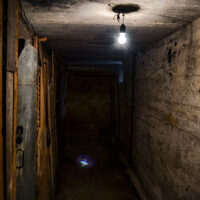 Nothing can ruin your holiday plans faster than a flooded basement. Instead of spending time with family and friends, you’ll be mopping up water and dealing with the costly repairs and inconvenience that come with basement leaks. It’s important to remember that leaks and flooding can happen at any time, not just during heavy rain. Winter is a particularly common time for basement leaks and flooding to occur.
Nothing can ruin your holiday plans faster than a flooded basement. Instead of spending time with family and friends, you’ll be mopping up water and dealing with the costly repairs and inconvenience that come with basement leaks. It’s important to remember that leaks and flooding can happen at any time, not just during heavy rain. Winter is a particularly common time for basement leaks and flooding to occur.
The root cause of most leaks is an accumulation of moisture. While it may seem obvious that moisture comes from rain, in the winter, it can also come from the frozen form of water – snow. As your basement radiates heat, it melts the snow and frozen soil outside, creating and trapping moisture between the ground and your basement walls and floor. This trapped moisture can then lead to leaks.
To help prevent leaks, it’s important to understand the common causes of basement water seepage in winter. Here are eight reasons why your basement might leak this winter:
- Basements radiate heat, melting snow and creating trapped moisture.
- Hydrostatic pressure, caused by the weight of the trapped moisture, can push it through cracks and holes in your foundation.
- Improperly designed or maintained eaves, troughs, and downspouts can deposit water too close to your foundation, leading to leaks.
- The wrong type of soil, such as clay, can retain water and lead to leaks.
- Improper grading can cause water to pool around your foundation, leading to leaks.
- Window wells can collect water and cause leaks if not properly maintained.
- Plumbing leaks can also cause moisture to accumulate in your basement.
- An inadequate or malfunctioning sump pump can lead to leaks during heavy rain or snow melt.
It’s important to keep in mind that while these are common causes of basement leaks, it’s always best to consult a professional to assess the specific issues with your home. Regular inspections and maintenance can also help prevent leaks and keep your home dry during the winter months.
Traditional waterproofing methods like drains, trenches, bentonite clay, exterior coatings, and sump pumps focus more on water mitigation than waterproofing. A basement encapsulation system like SANI-TRED actually seals all holes, cracks, and pores preventing any water from ever entering the structure.
